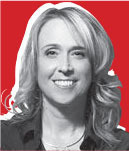How what we believe shapes our experience of reality
For more than 17 years, I have wanted to track down a night nurse from the Royal Columbian Hospital and give her a piece of my mind.
I had just given birth to a daughter. The delivery had been relatively smooth, and my husband and I had been awestruck by our new bundle of feisty joy. But shortly after the birth there had been a rising wave of pain, and I had been whisked into surgery to stop a post-labour hemorrhage.
I don’t know how much time I spent on the operating table, or how long I was unconscious afterward. The first thing I recall is a bleary awareness that there was a nurse standing over my bed. "Baby needs Mama," she said thrusting a wriggling infant into my arms. She walked briskly out of the room before I could ask her to tell me the baby’s name – or my own.
The urgent need to keep the newborn from falling out of my bed must have triggered enough adrenaline to cut through some of the narcotic haze. Eventually, I remembered with groggy gladness that I’d had a daughter. She settled into my arms and we dozed together as the anesthetic wore off.
Though things turned out okay, I’ve wondered why a nurse would hand a newborn to an incapacitated patient. All these years, the "Reckless Nurse Who Endangered the Baby" has been making appearances in my daughter’s origins story. Until now.
A recent exchange with a friend – my colleague Chris – has cast my whole narrative into question.
Chris had just discovered that, due to complications during his own birth more than 60 years ago, he was separated from his mother as a newborn for a few days. "This new detail," he shared, "explains an undercurrent of anxiety I wrestled with in my childhood and even into adulthood. There’s all kinds of research showing that it’s best for the baby and mother to be together, and when they can’t be, long-term anxiety issues can be one of the results."
Listening to Chris’ epiphany, I had one of my own. In a flash, the "Reckless Nurse Who Endangered the Baby" morphed into the "Heroic Nurse Who Facilitated Essential Bonding." I was suddenly deeply grateful for a woman I had resented for 17 years. Rather than giving her a piece of my mind, I wanted to give her a hug.
I am not sharing this story because of anything it says about maternity protocols. (Certainly, there are times when mothers and newborns can’t be together, for unavoidable reasons.) Rather, I’m interested in what my sudden change in perspective reveals to me about stories themselves – about the way the stories we tell ourselves shape our experience of reality.
I hadn’t even realized I had been telling myself a particular story about that nurse, or that it might be possible to write an entirely different narrative about her actions. That’s the tricky thing about the stories we tell ourselves – because we are living inside them, they are hard to detect. We may not even realize we are telling ourselves a story about what we are experiencing. And some of those hard-to-detect stories are much more fundamental – and have far more extensive implications – than my daughter’s origins story.
Consider, for example, our more cosmic origins story. Were we created to meet the needs of a lonely deity? Or to participate in the loving overflow of the Trinity? Is God waiting for us to earn His affections? Or has He loved us boundlessly from the beginning?
The story I tell myself about just those questions – the nature of God and the way He feels about His creation – will profoundly affect the way I narrate reality. In hard times, it is my underlying story that will determine whether difficult experiences are proof God doesn’t care about me, or occasions to experience His nearness and ability to redeem even my pain.
There are no uninterpreted facts, no unnarrated experiences. But if we co-operate with the Holy Spirit, He’ll use sources – Scripture, creeds, scholarship, conversations with friends, attentiveness to our own experience, slow realizations and sudden epiphanies – to help us get our stories straight.

Carolyn Arends (www.CarolynArends.com) is a recording artist, author and director of education for Renovaré. Find more of these columns at www.FaithToday.ca/GoWithGod.